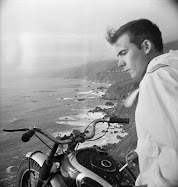The old lady looked awful. She was as pale as a sheet and barely animated. She wasn’t able to speak. Her skin was cool to the touch and her face bore the distress of inner torment. On her best day, she had a personality like a bag of snakes. Her hatred for me was part reflex and part instinct. Though there had never been any love lost between my mother-in-law and me, I certainly didn’t want to see her like this. I never wanted to see her at all, but circumstances intervened. And now she was here, hovering in the gray area of life on our little vacation to the mountains.
My plan had been to escape to the Adirondacks (the savage mountains of New York), to skinny dip in the creek; to sip wine in the moonlight; and to fool around with my wife in between... Then she asked, “Can we take my mom.” I would rather have taken poison. Her mother was getting on in years and becoming reclusive as well as abusive. The old bat never really came out of her room but her presence was like the shadow of plague. I could deny my wife nothing, and her mother had accompanied us on trips before. Yet this place was nowhere like anyplace we’d ever been before. It was personal solitude for two. I didn’t want her presence coloring the mist. The old lady in the narrow bed hadn’t moved in 24 hours. I didn’t like the looks of this.
We were tucked away in a remote Adirondack cabin, where the primitive road dissolved forty feet before the driveway began. It was the last house on a power line that stretched 11 miles through woods where desolation was the fifth season. We’d be on our own if the lights flickered. They flickered now, and went out, as a deafening clap of thunder shook the house. A low moan escaped my mother-in-law’s lips as she clawed her way back to consciousness. Then the storm broke and the house was enveloped in the drumming of a maniacal rain.
There was an hour left to sunset, but the cabin was high up, on the western end of the valley, in the shadow of the Sentinel Range. It got murky fast in the center of the clouds, and my wife of seven years lit candles. Only one of them was for light. She was the first to speak: “I’m going to call the doctor.”
I said nothing. The unspoken question “What can he do?” hung in the air.
As savage as the Adirondacks can be, there are remote communities of artists, musicians, and craftsmen scattered throughout these mountains. Among them are the deep forest retreats of scholars, philosophers, and medical people. By chance, the leading expert in my mother-in-law’s condition summered in the hamlet of “Beaver Creek,” about 9 miles distant. He’d come, if he was home. He might reach us in 20 minutes. I knew we didn’t have an hour to wait for the inevitable.
“The phone is dead,” said my wife. Cell coverage wasn’t even a thought.
“I’ll go get him,” I said.
The physical action of doing something would be better than just being in the gloom of the cabin, knowing what was transpiring in the loft bed, though I was pained to leave my wife alone with her mother in this state. The rain poured off the porch roof like a liquid curtain. I got thoroughly soaked stepping through it.
You get used to some things working the same way, day-in and day-out over the years, and there is a second of disbelief when they don’t. Turning the key in the Suburban’s ignition produced only silence, made more poignant by the drumming of the rain. I tried again. Nothing. Then I yanked the headlight switch. Nothing. I’d left the courtesy lights on. All twelve of them. The battery was dead.
There might have been one or two ways to jump the truck, if I’d had time, or access to a phone. But I had to go — now. Parked under the eaves of the back shed was the 1986 K-75 (with the rare Sprint fairing) known as “Blue Balls.” I grabbed my jacket and helmet from a peg inside the shed door. The K75 growled into life as soon as I’d touched the starter, but it would take a minute the old lady couldn’t spare to warm up.
The driveway was 80 percent gravel and 20 percent water. The road was worse. A long, downhill, twisting slide into the valley, the steady torrent took the path of least resistance, sweeping the gravel into the curves. Branches and deadfalls hung up in the shallow current, collecting debris piles of their own. I snicked the K75 into first and scudded onto the road. The water was an inch deep against the treads, but the tires bit and I headed out.
The jacket was mesh and the rain was cold. It’s hard to understand how these mountains can be as humid as the Yucatan jungle on one day, and cold enough to leech the warmth from a body 24-hours later. It was early August and the temperature was barely 60 degrees, only 6 hours north of a sweltering New York City. I wore the jacket because it was at hand and I thought its armor would be better than nothing in a fall.
I stuck to the crown of the road with moderate success. Super cautious at first, I felt more confident and worked the K75 into third. The crown seemed like a good idea in the beginning, but the outside furrows of the road were getting edged deeper by the run-off, and I nearly bogged down in these. A bigger mistake would have been to stop on the crown and to have put my foot in one. It never occurred to me that I could have gotten pinned under the bike, and drowned in nine inches of water.
I came across the first sizable tree branch blocking the road about three miles into the run from hell. It was a dead birch branch, about three inches in diameter, but all snaky with little twigs on it. Detritus was washing along its tapered length to the narrow end, which was pointing downhill toward a curve with negative camber. My first thought was to just slosh over the narrow end, but the water roiled into the underbrush there and I didn’t like the looks of it. So I rolled over it’s center, with broke with a loud pop. The crown of the road was hard enough to support the bike, though the branch’s narrow end popped up and followed the current over the lip.
The next two miles were slow but steady going and I knew I was running out of time. There were more dark patches than gray and coming back this way, even in the Doc’s Jeep, would be no picnic. The doctor would be with us for the night. That would be so much better for my wife. The road was covered by water at Wolfe’s Fork. In the gathering darkness, I couldn’t see how deep it was against the surrounding trees, and stopped, putting my feet down. The water ran over the tops of my boots. The headlight had been growing in influence as it got darker but the surging water just swallowed it. I had only a vague idea of where the road ended and where the swamp began.
“Shit on this,” I thought. I gave the engine three or four good revs and let out the clutch. I steered through the junction, keeping to the center, knowing full well the road veered to the left somewhat, and that I’d be on the very edge of ground stable enough to hold the bike.
Then I was through it.
The crown of the road was higher in this stretch and the trees were cut farther back. It was easier to see more of the hard-packed cinder surface in what was left of the gray murk. I had three miles to go. I played the road over and over again in my mind. There was a turn coming up here and a bit of a dip there. I took every curve upright. There was no point in losing a second to dropping the bike. I kept the engine revving in third.
Life deals you an odd hand every now and again. My mother-in-law’s relief depended on the person she hated most. I couldn’t remember a day when she didn’t hate me. The night before I was to marry her daughter, she offered me $10,000 to get lost. (Naturally, it was a personal check.) The highlight of every wedding reception comes when the multitiered cake is wheeled out. At our wedding, my mother-in-law swaggered over to the cake and bit the head off the little groom doll at the top. Then she spit it into the punch.
“I’ll make you wish you’d taken the money,” she sneered.
You have to wonder what could make a person so nasty. My mother-in-law was the first of her family to be born here in the United States. Her mother came from Ireland, probably with funds stolen from the church poor box, and opened a waterfront bar called “Tar Box Molly’s.” My mother-in-law grew up spitting in the beer of semiconscious sailers and wharf rats. I could only imagine the scenes that passed for her childhood.
The scene before my eyes brought me to a sliding halt.
For years, a pokey little rivulet dripped through a rusting culvert deep under the road. That trickle flexed its muscles today, ripping out the old corrugated pipe and pavement, leaving only a stretch three feet wide and ten feet long. The water roared and surged like a living thing trying to squeeze through a tight collar. It was within an inch of devouring the remaining pavement.
“Fuck me,” I hissed.
I was beaten. The rain strained through my mesh jacket, carrying the stain of surrender.
The woman I was married to got a raw deal. When she needed a carpenter, she got me. When she needed a mechanic, she got me. And now, when she needed a hero, she got a pissant too terrified to risk all when it counted. The clammy misery of failure enveloped me like a mist. Looking down into the mad rush of the water, I saw her face as plain as day. I saw the depth in her eyes. I saw her mouth, drawn back in that familiar sneer. And I heard my mother-in-law say, “I knew you couldn’t do it. Now my daughter will know it too.”
I screamed into the rain.
Some will say I acted foolishly. I pulled my Mini-Maglite out of my pocket, twisted it on, and dropped it just off center of this causeway. Then I retraced my steps for about three hundred feet, revved the engine to 5 grand, and let that K75 go. It fishtailed and slid. It caught. I shifted twice and got it up to 45. I couldn’t even see the ripped culvert in the rain and mist. But I could see the Mini-Maglite. I passed it just to the right.
You cover 66 feet per second at 45 miles per hour. I was in and out of the cobra’s mouth in the blink of its eye.
I pulled up at the Doc’s place blowing the horn and yelling. He was just inside, smoking a cigar by lamplight.
“Doc! It’s the old lady. You gotta come now.”
“We’ll take my jeep,” he yelled back.
“We gotta take this. The road’s gone.”
I suspect the doctor has had a hell of a life. He barely nodded. Then he was on the back with an oiled coat and his old medical bag between us. I’d seen the well-creased leather bag in his hall a dozen times. He’s made a few house calls in the desperation of these mountains before. We recrossed the culvert without slowing. He wouldn’t let me slow down going up through Wolfe’s Forks. There were times when both of us held the sliding bike with our feet.
The doctor was off the K75 and up the stairs almost before I’d brought it to a complete halt. He knew his business. The last vestige of daylight was fading and in that feeble light, my mother-in-law recognized his face — and knew I’d brought him. She knew I’d succeeded. Then the doctor pulled a wooden stake out of his bag and used a mallet to drive it through her heart.
“We barely made it in time,” said the doctor. “Tell your wife to leave the damn stake where it is. You and I can drag this thing out into the daylight tomorrow and that will be an end to it. Why the hell would anyone want an old vampire hanging around anyway? Tell your wife I’m not doing this again.”
©Copyright Jack Riepe 2013
All rights reserved.
Who Reads Twisted Roads?
Josh Campbell
Above: This is Josh Campbell hard at work, feeding baby humming birds, perched 9,000 feet above central Kansas. Each hummingbird chick gets a cheeseburger the size of button and black coffee from an eyedropper. Welcome to Kansas. Two great pictures, Josh. (above & below)
Above: These are Josh Campbell's bikes in a very cool picture. On the left is a 2002 Suzuki SV650 which Josh claims "rekindled my love affair with motorcycles." On the right is a 2007 Kawi ZX10R, which he says, "has no soul but satisfies my need to taunt fate."
Lee Shreve
Above: Lee Shreve (North Carolina) has rolled out an impressive array of Teutonic motorcycle muscle. On the left appears to be a K75 in my favorite shade of red. Next appears to be an R100/7, with a K1200LT on the right. Way to go Lee!
Rodney Lyons
Above: Rodney Lyons wins the long-distance reader appreciation award for this episode, writing in from Western Australia. An eclectic rider, his stable features a prized Yamaha Classic and a beautiful Piaggio MP3 (300) in the back. Everybody knows that motorcycle tires are cheaper when you buy them in lots of 5! Rodney paid me the highest compliment. He said, "Riepe, you writing about Australia is a lot like me writing about Jersey City." Praise indeed. Thanks, Rodney.
Do you read Twisted Roads? Send me a picture of you and your bike, and you just might win a prize! Send pictures to jack.riepe@gmail.com. Write, "Reader's Photo," in the subject line.
















